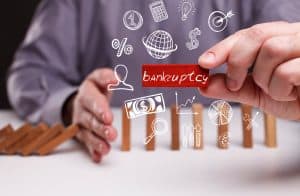
Filing bankruptcy is a significant life decision, but sometimes it’s the best step forward if financial troubles spiral out of control.
Knowing when to consider bankruptcy can be confusing, especially with the stigma attached to it. Nonetheless, understanding the circumstances that warrant it can help you make an informed, confident choice. If you want to learn more, read on.
You’re Unable To Pay Your Debts
One of the clearest signs it might be time to consider bankruptcy is when you’re simply unable to pay your debts. If you’re constantly borrowing from one credit card to pay another, skipping bills, or watching interest grow faster than you can manage, it’s time to reevaluate. This cycle of debt can feel impossible to break on your own.
In cases where your income can’t keep up with your expenses, bankruptcy in the United States may offer relief. It allows you to reset financially, discharging unsecured debts like credit card balances, personal loans, and medical bills, so you can focus on starting fresh.
Don’t worry. If you need bankruptcy help, you can work with experts. Say you’re a Floridian who’s drowning in loans. If that’s the case, luckily, you can partner with a trusted bankruptcy lawyer for debt relief in Jacksonville or whatever city you’re in. They can start the whole bankruptcy process for you.
You’re Facing Debt Collectors And Legal Action
When debt collectors are calling non-stop or you’re facing legal threats, it’s a clear sign your financial situation has spiraled. Creditors may pursue lawsuits, wage garnishments, or bank account levies to recover their money. These aggressive actions can not only damage your financial health but also cause stress and anxiety.
Filing for bankruptcy halts creditor harassment immediately. Once you file, an automatic stay is issued, which means creditors must stop all collection efforts. This gives you the breathing room you need to reorganize your finances or discharge your debts altogether.
Your Assets Are At Risk
If your home, car, or other valuable assets are in jeopardy of being repossessed or foreclosed upon, bankruptcy could be your best defense.
Luckily, bankruptcy proceedings can help you keep these assets by restructuring your debts into a manageable repayment plan. This works well for individuals with a steady income who just need more time to catch up on payments. It can stop foreclosure proceedings and help you maintain ownership of your property while you get back on track.
You’re Relying Solely On Credit To Finance Your Everyday Essentials
Are you using credit cards to buy groceries or pay for utilities? If you’re depending on loans to meet basic living expenses, it’s a red flag that your finances are unsustainable. Relying on credit just to survive can quickly lead to maxed-out credit lines and crushing interest charges.
Filing for bankruptcy may give you the chance to wipe the slate clean, so you can focus on covering essentials without falling into a deeper hole. It provides a legal way to eliminate unmanageable debt and create a more stable financial future.

You Have No Realistic Chance To Pay Off Your Debt
Sometimes, your debt is simply too large to pay off within a reasonable timeframe. If you’re only able to make minimum payments and your balances aren’t decreasing—or worse, they’re growing—you may never escape the burden. Luckily, bankruptcy is designed for people in this situation.
You’ve Already Tried Out Different Forms Of Debt Relief Sans Success
Many people explore other debt relief options before considering bankruptcy, which makes sense. Debt consolidation, settlement programs, or credit counseling are all viable routes for reducing debt. Nonetheless, if you’ve tried these solutions and are still drowning in debt, it might be time to look at bankruptcy as a more powerful solution.
Debt relief programs don’t always work for everyone, and some people find themselves deeper in debt due to fees or penalties. Bankruptcy, while a more serious step, can offer a more comprehensive solution to wipe away the majority of your debts, providing a clean financial break.
Your Health Has Already Been Negatively Impacted By Debt Stress
Financial problems don’t just affect your wallet—they take a toll on your mental and physical health as well. Constant worry over bills, collection calls, and legal threats can lead to anxiety, depression, and even health issues like high blood pressure.
If your debt is adversely affecting your quality of life or health, it may be time to consider bankruptcy. Reducing your financial burdens through bankruptcy can allow you to focus on what’s most important—your well-being and peace of mind.
You Want A Hard Reset
At the core of bankruptcy is the opportunity for a fresh start. It’s designed to help individuals who are overwhelmed with debt regain control of their financial lives. While it comes with consequences, like a drop in your credit score and a public record of the filing, it can ultimately set you on the path to a brighter financial future.
If you’ve come to the point where you’re ready to move on from your financial struggles, bankruptcy can offer the chance to hit reset and rebuild your credit over time.
Final Words
Filing for bankruptcy isn’t an easy decision, but it can be a lifeline for those drowning in debt. If you’ve exhausted all other options, can’t keep up with bills, or are facing constant harassment from creditors, bankruptcy may be the best path to a fresh start.
Take control of your financial future today by exploring the right bankruptcy option for your needs. While it’s a difficult process, bankruptcy can provide the relief and stability you need to rebuild and move forward with confidence.






